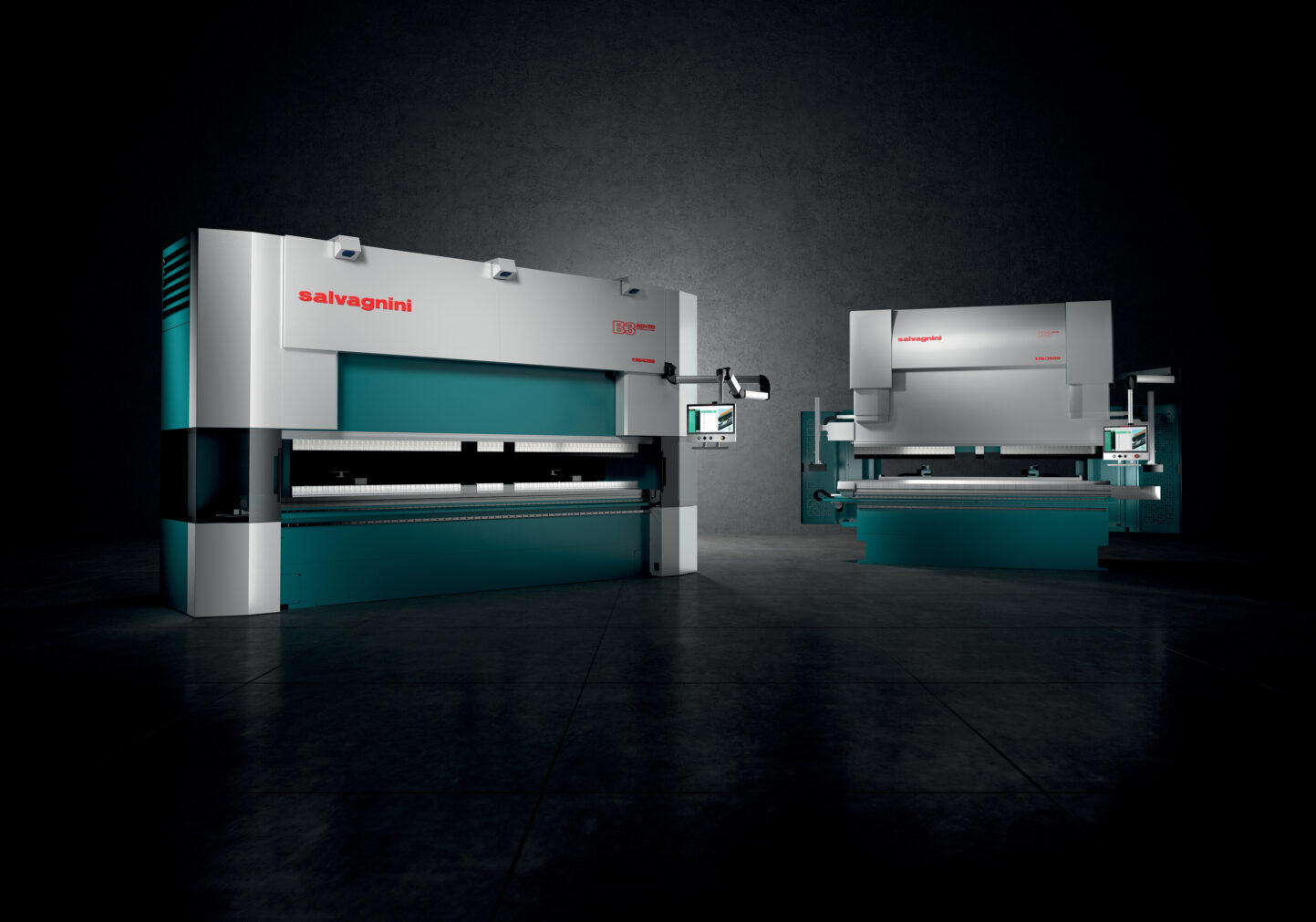
Automatic set-up and tool change are the two most obvious strengths of B3.AU-TO, the Salvagnini press brake. Designed combining features and benefits of electric and hydraulic solutions, aside from the batch sizes, the shapes to be bent and the experience of the operators, B3.AU-TO significantly extends the availability, autonomy, and flexibility of the press brake.
Even in the case of advanced, precise, and fast technologies, manual press brakes are limited by factors such as re-tooling and set-up times as well as downtimes for sheet metal feeding, programming and part handling and checking. The Salvagnini B3.AU-TO is the definitive solution for all companies having to exceed these limits to cope with a dynamic market, which demands increasingly smaller batches, kit productions or batch-ones with very short lead times. The AU-TO automatic tool change and the ATA automatic tool adjuster, which adjusts the length of the stations, significantly reduce the press brake re-tooling phase, increasing autonomy and productivity, while also reducing the lead time. The press brake can be programmed on the machine, using the FACE human-machine interface, but Salvagnini recommends programming in the office: the STREAMFORMER software automatically creates the bending sequences, set-ups and bending stations, integrating perfectly with the AU-TO and ATA devices, enhancing the performances. Programming in the office also increases productivity, as while the programmer deals with the programs in the office, the operator continues to bend. The main objective is to minimize waiting times, making the press brake as efficient as possible. B3.AU-TO is available in four models, with maximum bending length 3 or 4 meters and maximum force 170 or 220 tons.
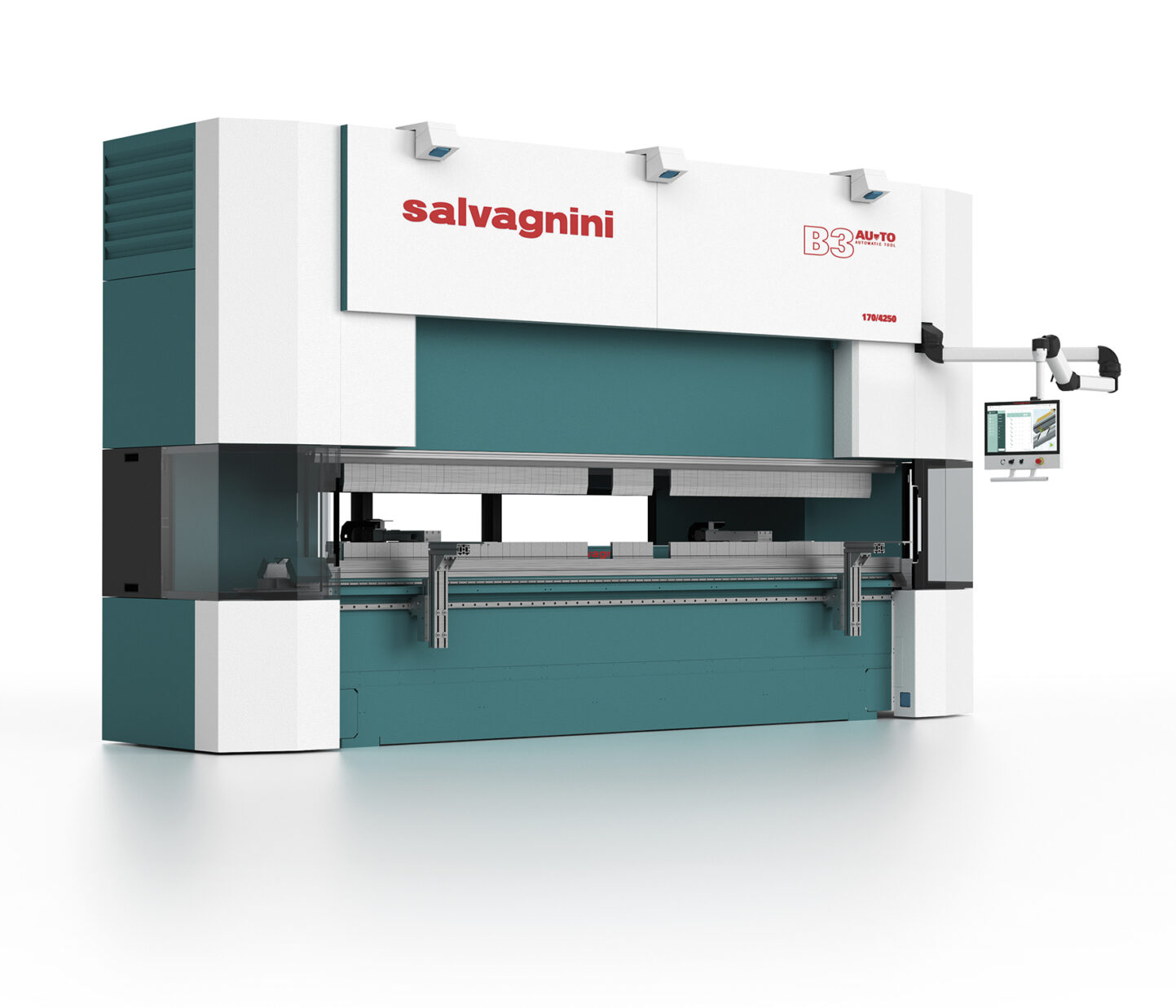
AU-TO: maximum automation, maximum efficiency
The Salvagnini-patented upper and lower automatic tool change unit is the real distinctive feature of the B3.AU-TO. AU-TO tools the press brake, guaranteeing complete autonomy and efficiency in applying the best strategies on the basis of the production flow. AU-TO reduces set-up times and increases the availability of the B3: the operations are rapid and in cycle, even in masked time, helping to further increase the efficiency of the press brake. The tool store is covered and located in the rear part of the B3. It can contain up to 24 meters of tools up to 1000 mm in length without segmentation, and this makes the press brake the solution with the smallest footprint on the market. AU-TO does not exclude the ATA functions, the automatic tool adjuster used to change and automatically adjust the upper and lower bending tool length, saving time and increasing production efficiency. AU-TO and ATA are exclusive, patented devices, while in terms of tools, full flexibility is assured, because the press brake allows mixed re-tooling: after the automatic tool change and set-up, the B3.AU-TO integrates the standard WILA tools or special tools on the bend line, including hemming tools. These tools are installed and then removed manually by the operator before the subsequent automatic tool change.
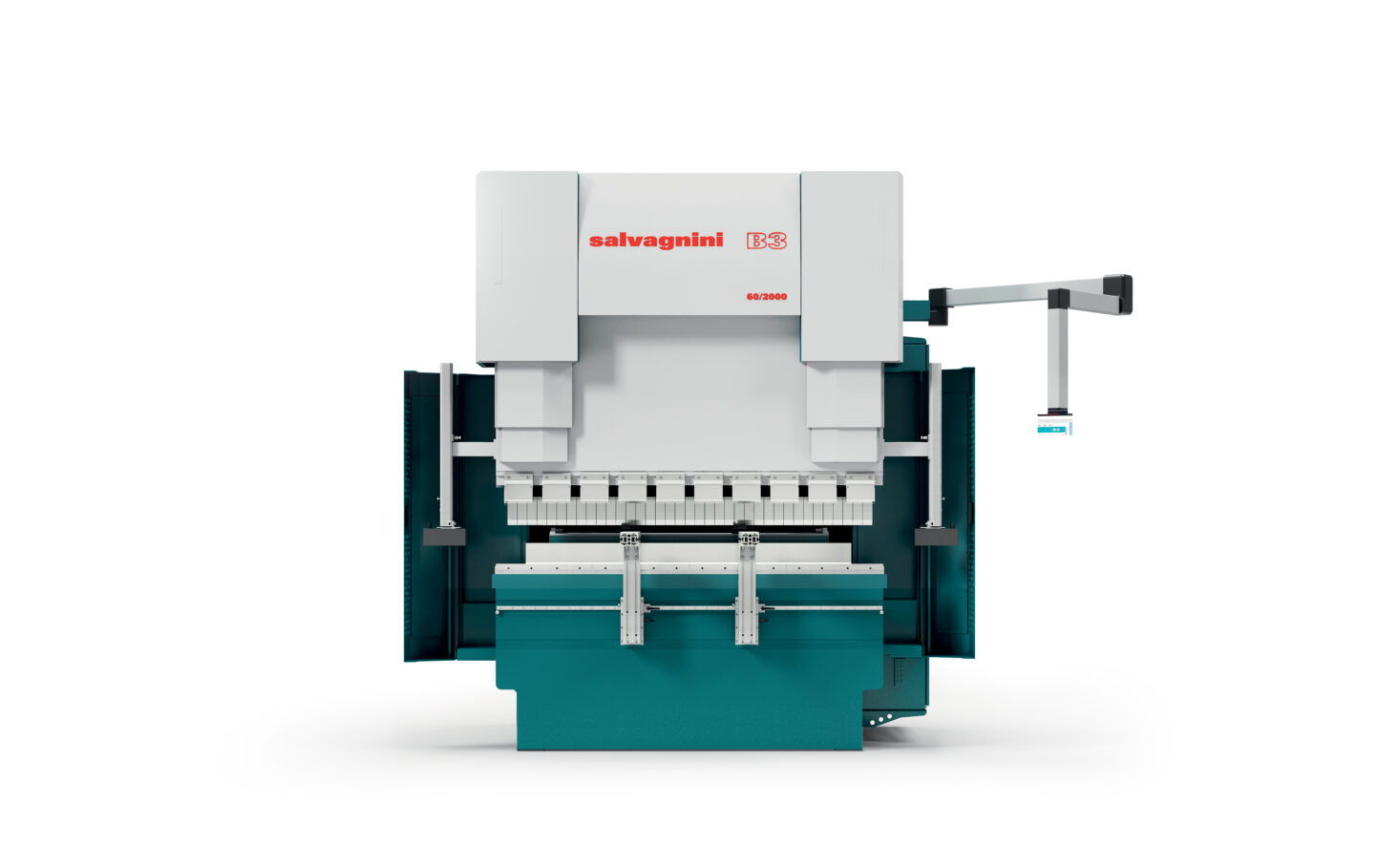
Adaptive technology
Increasing efficiency during tool change and set-up does not mean losing sight of precision. For all the B3 press brakes, Salvagnini offers MAC2.0 – a set of integrated adaptive technologies that make the system intelligent and cancel out waste and corrections. S-Crowning is a mechanical crowning system that ensures consistent bending angles along the entire bending length: as the parameters – material, thickness, length and therefore the required bending force – change, the effective curvature of the lower table is measured and compensated in real time, without any operator intervention. AMS, the laser angle measurement system, detects and corrects variations in the bending angle due to sheet metal spring back. Regardless of the length of the press brake and of the part being machined, the angle is always measured in a single point: this approach helps reduce the cycle time without compromising on precision, which is guaranteed by the interaction between AMS and S-Crowning.
More productivity, more sustainability, more safety
While, with AU-TO and ATA, the Salvagnini press brake is extremely rapid during set-up, safely predicting the re-tooling times, its higher productivity compared to conventional solutions also depends on the maximum ram speed. The B3 is a hybrid press brake combining the features and benefits of electric and hydraulic solutions available on the market: it achieves the typical tonnages of hydraulic presses, with the speed of electric presses. The technical solution that controls the ram movements is the Direct Drive: two independent direct-drive brushless motors, activated only when needed, allow the ram to reach fast approach and fast return with speeds up to 250 mm/sec depending on the chosen B3 model. Another Salvagnini proprietary system is KERS, which recovers energy waste and reuses itin subsequent steps, accelerating and reaching higher speeds with the same consumption. And to ensure complete safety, the B3 automation devices boast another major feature: radar devices, which guarantee extremely high safety standards. Without physical barriers to protect the bending zone during automatic set-up, these ultra-high frequency radars detect any movement in the safety area: for example, they are able to detect human breathing - even when trying to stand still, an operator will always be detected. On the other hand, an object - a stool, a metal sheet on the front sliding shelves, a pedal set - can be left in the safety area without any problem.
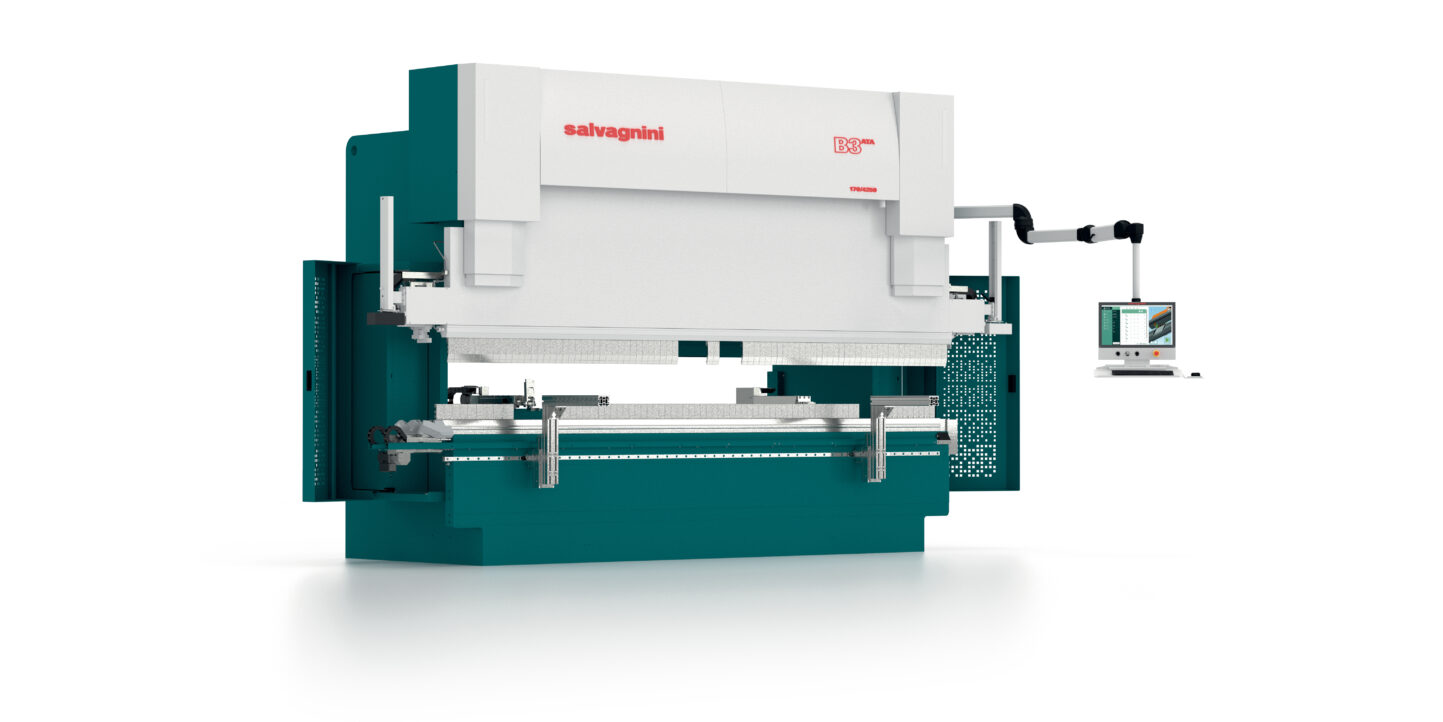
Programming? In the office and on board the machine
Offline software is still not very common in the press brake market. If for 2D technologies, such as laser, the ratio between machines and software is practically 1 to 1, in the world of traditional press brakes, it is more realistic to consider a much higher ratio. On one hand, because the press brake is a manual machine, able to work even without the offline programming software. On the other hand, because an expert operator is generally able to make the required parts. However, Salvagnini has seen a clear reversal in this trend: more and more customers are purchasing the CAM software STREAMFORMER to face the increasing difficulty in finding expert operators. When STREAMFORMER is available in the office, it makes it possible to perform activities in parallel, because while one technician is creating the programs, the operator can continue to bend - which reduces to zero the impact of the programming time on the production efficiency of the press brake. In addition to automatically creating a bending sequence, STREAMFORMER also automatically defines the bending stations and tool set-ups, perfectly integrating with the AU-TO and ATA devices and enhancing their advantages. When STREAMFORMER is not available, programming can be carried out directly on board the machine, using the FACE human-machine interface, which not only enables conventional numerical programming but also graphical programming with PRESSTUDIO.
Programming all technologies in a cooperative environment
STREAMFORMER is part of STREAM, the Salvagnini programming suite, and allows the press brake to be included in an integrated production process. In addition to 5 different CAM software packages, each associated to a specific technology, STREAM also includes VALUES and PARTS. VALUES provides an accurate estimate of production costs, while PARTS is used to manage the whole database of the company’s products, defining the production flows for each part, centralizing all the information and providing the programmer with a single point for controlling and performing the programming activities. For parts that can’t be completely produced on the panel bender, PARTS allows STREAMBEND and STREAMFORMER, the panel bending and bending CAMs, to dialog natively, in order to obtain a mixed program. The panel bender always has priority: STREAMBEND automatically elaborates the panel bending program; immediately afterwards, STREAMFORMER automatically elaborates the program to complete the remaining bends on the press brake. In the workshop, the panel bender and press brake are connected by a software interface that allows the B3 to automatically load the program once the bending cycle has been completed on the panel bender. The press brake autonomously prepares the tools, and the operator only has to run the preloaded program: this interface therefore improves the efficiency and productivity of the process and drastically reduces the risk of error. At EuroBLECH, precisely to underline this software interface and the level of cooperation between the two technologies, the B3 will receive some parts to complete from the S1+P4 line. Like all Salvagnini technologies, B3.AU-TO is therefore the ideal solution for the Industry 4.0 paradigm, and can be easily integrated into the company ecosystem.
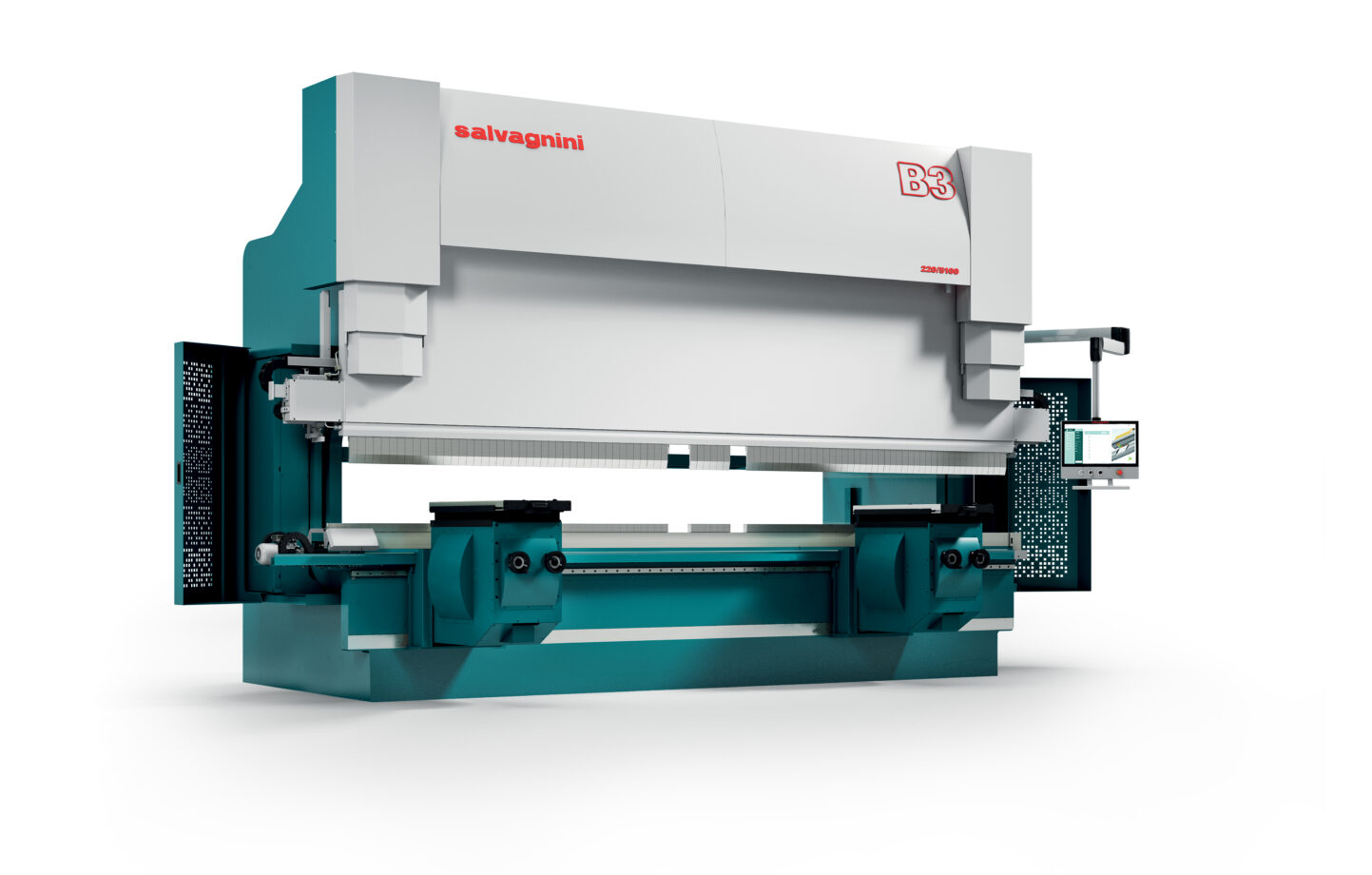
Optimizing re-tooling with software
The availability of advanced devices like AU-TO and ATA is not in itself an absolute guarantee of efficiency; a disorganized production sequence and a large number of re-toolings can in any case reduce the productivity of the press brake. To also solve these critical issues, Salvagnini has equipped its offline software with a further level of intelligence, acting on the production process to manage it in the best way and perform some of the workshop activities that are normally performed by the most skilled professionals, who are increasingly hard to find. STREAMFORMER and PARTS allow to automatically program the parts in a job list, reducing the number of re-toolings between different programs. Analysing the shape of each part and identifying the best bending sequence to produce them, before identifying a new and different re-tooling the software always tries to use one that has already been used for other parts in the job list. This approach helps to reduce the total number of re-toolings, in any case giving the programmer the faculty to easily intervene on the position of the references, bending sequence and re-tooling. The B3 version of OPS, the modular software for managing Salvagnini production, has a feature that automatically optimizes the production sequence to minimize overall re-tooling times. Integrating the press brake with OPS allows to exploit an algorithm to identify the most efficient sequence. Exploiting OPS means improving the productivity of the press brake: a unique and outstanding proposal on the market, which looks at the bending process as a whole in order to recover marginality. These two software automations are another great new feature that will be presented as a world preview at EuroBLECH, completing the path to significantly extend the availability, autonomy, and flexibility of the press brake that Salvagnini began with the introduction of ATA devices.
The high-efficiency press brake
B3.AU-TO is the ideal press brake for companies with a high daily item turnover rate that demands an extremely high number of re-toolings. The AU-TO and ATA devices reduce the cycle time, making it easier to predict, plan and monitor. The possibility to use WILA tools for mixed re-tooling, the integrated adaptive technologies, Direct Drive, KERS and the new possibilities offered by the software further extend the performance of this cutting-edge press brake. The direct consequence of integrating a B3.AU-TO into your production cycle is greater process efficiency and greater reactivity, which turns into greater daily productivity and therefore higher profitability.